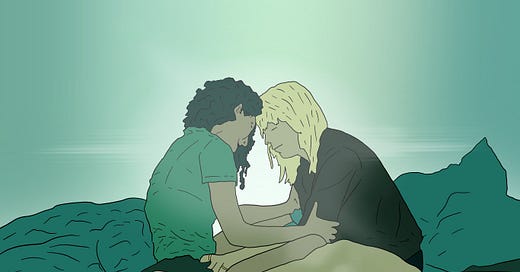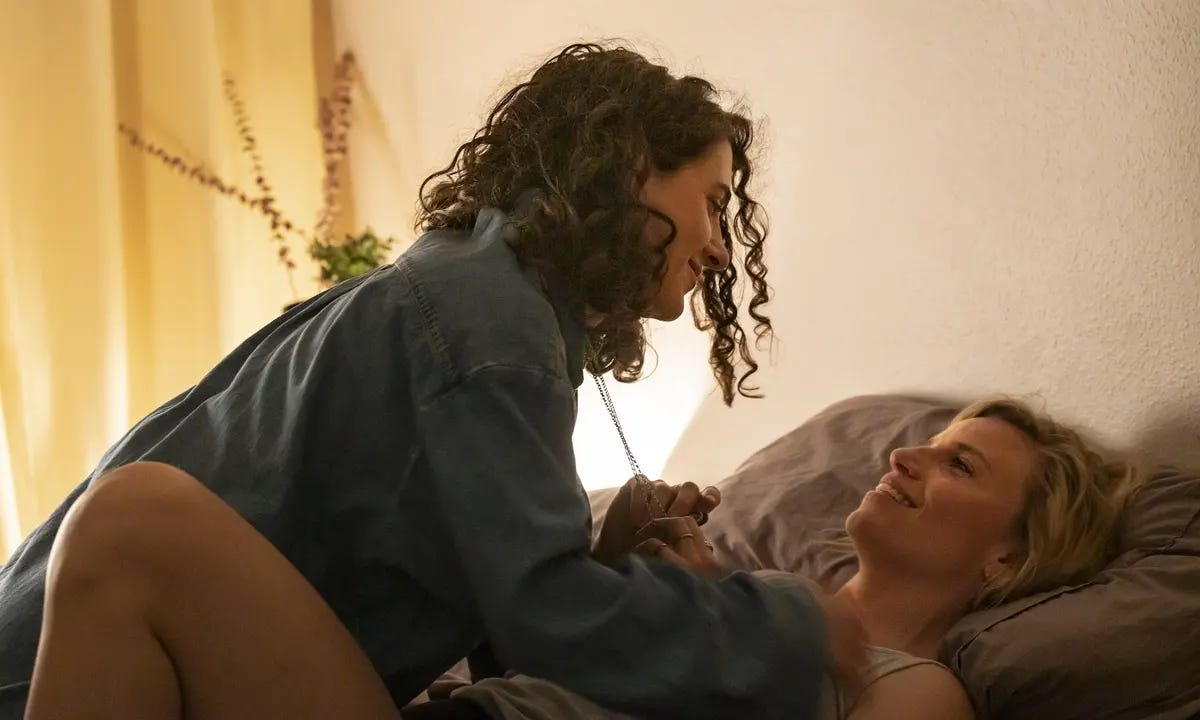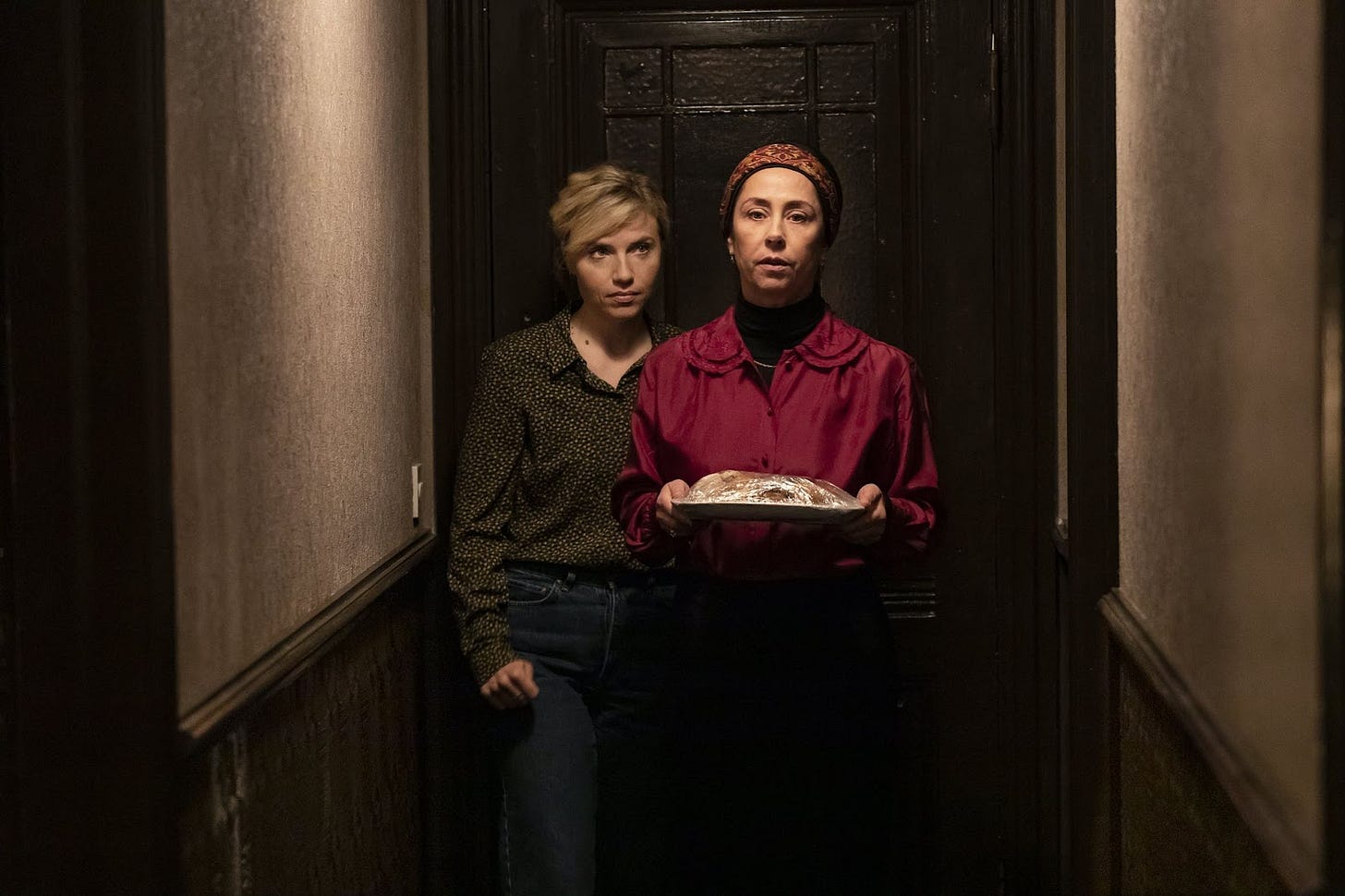Review: The Urge to Merge
‘Attachment’ is every lesbian’s worst nightmare (U-Hauls, mommy issues, and dead cats)
Hello, hello, hello! Be sure to check out ‘The Elephant in the Werkroom’ after the review for a Drag Race recap and more.
The Yearning Rating: ✰✰✰½
Romance ✰✰✰✰
Sex ✰✰✰½
Storytelling ✰✰½
Performance ✰✰✰
Yearning ✰✰✰✰
Light spoilers ahead for Gabriel Bier Gislason’s Attachment.
Written by Ali Romig
When washed up actress Maja meets Jewish scholar Leah, the two fall deep into a whirlwind romance. Like any lesbian hookup worth its salt, what starts as a one-night stand quickly turns into pantless days of barely leaving the apartment, which eventually turns into an intense, almost obsessive closeness. But then, Leah suffers a seizure and breaks her leg, interrupting the pair’s weeks-long, coital bliss. Forced to return home from Copenhagen to London, Leah prepares to say goodbye to Maja, who, unable to bear the idea of separation, spontaneously offers to go with her.
Leah's London flat is surrounded by the conservative Jewish-Orthodox community she grew up in and the culture shock is immediate for goyish Maja. And what’s more? Leah shares a home with her mother, Chana, a hard-to-read woman who barely looks Maja in the eye when they arrive. Suddenly, the three women must learn how to co-exist: with Maja awkwardly trying to make a place for herself amongst Leah and her mother’s traditions, Chana wary of her daughter’s new girlfriend, and Leah struggling to placate them both. There are misunderstandings, awkward dinners, and fights over the importance of knocking before barging into your adult daughter’s bedroom.
If this all sounds like a vaguely heartwarming rom com—one in which a daughter’s partner and family must learn to overcome their differences and get along—that’s probably because the setup for Gabriel Bier Gislason’s Danish horror-romance Attachment uses many of those same tropes. But by replacing post meet-cute hijinks with things that go bump in the night, the film quickly subverts expectations—and in doing so cements itself as a welcome addition to the queer horror canon.
There are few things lesbians dread more than being accused of U-Hauling. In fact, I think we dread the accusations almost as much as we love the act. That said, there’s a very real anxiety that comes with a quickly-serious relationship—you know, when you look up at your person, the one you’ve just merged your life with, the hormone-riddled haze fading from your eyes, and realize that they are, essentially, a complete stranger. In Attachment, Gislason mines this concept in ways both humorous and poignant to create a distinctly lesbian horror film. This may come as a surprise, given Gislason is a man, but it makes more sense when you learn that he wrote the script specifically for lead actor Josephine Park, basing it on a real life experience she had with an ex-girlfriend1.
As a woman-loving-woman2, I felt embarrassingly seen when, shortly after the new lovers have moved to London, Leah (Ellie Kendrick) looks at Maja (Josephine Park) while they’re lying in bed and says, “I just think it’s really weird…that we hardly know each other.” Maja inhales sharply. Leah’s just said the quiet part out loud, the thing that they both know is true, but are reluctant to acknowledge, for fear it might burst their love-bubble. “I guess I just want to thank you,” she finishes, because despite what Maja is learning about Leah’s complicated home life, she has stuck around. While the moment is ultimately a sweet one, it brings to the surface an underlying tension. What happens when your paramour goes from starry-eyed—who is this person? Where did they come from? How did I get so lucky?—to realizing the very alarming truth behind those same questions? No, really, who are they? Who is their family?? What kinds of weird childhood shit are they repressing???
Attachment is much more interested in this kind of psychological stress than in jump scares or boogeymen, and because of this the pacing may seem slow to some. However, I would describe its un-harried storytelling as pleasantly indulgent…and utterly disquieting. This is especially true once Chana (Sofie Gråbøl) is introduced. For the most part, the audience sees the film’s world through Maja’s eyes; and to Maja, Chana is a frustrating enigma. She’s both overbearing and completely unreachable, refusing to give into Maja’s charms even the slightest bit. Like many gay plus-ones, Maja worries that Chana’s coldness might stem from her not being okay with her daughter’s queer relationship—but Leah promises that’s not the case.
Still, Maja can’t shake the feeling that she’s unwelcome. Her disappointment at not being able to get Chana to let her in eventually turns to suspicion, and finally, outright distrust. This push and pull between the two serves as driving force for the film, especially as it becomes increasingly clear that Chana is hiding something about Leah’s childhood from Maja. Gråbøl is a force as the hardened, mysterious Chana—she moves through the film like a haunting in her own right, popping up in scenes in a way reminiscent of a classic horror villain, but always with a pained look in her eyes that lets the viewer know there’s something deeper going on.
The dynamic between Maja and Chana is, of course, dramatized—most people don’t assume their partner’s parents are actually serving them poisoned soup (I hope!)—but it’s also chillingly recognizable for many out queer people. When failing to form a connection with a partner’s parent, it’s natural to be burdened by an onslaught of uncomfortable internal questions. Do they not like me because I’m gay? Do they believe I’m corrupting their child, even if subconsciously? Are they just not very warm people? And if so, how will that affect my relationship? It’s a complicated and confusing spiral, and one that leaves you doubting both yourself and your perception of things. Which is a great headspace for a horror movie protagonist to be in, narratively speaking (not so great for IRL queers).
Among all this sapphic self-doubt is another layer of disconnect between Maja and the space she’s (rather heedlessly) thrust herself into. The Jewish customs and traditions that Leah and Chana observe in their home are unfamiliar to Maja, who finds herself increasingly isolated. Even more unfamiliar are the traces of Jewish folklore and mysticism that Maja discovers—and almost automatically perceives as menacing—around the shared flat. Her quest for answers leads her to Leah’s Uncle Lev (David Dencik, who adds a welcome burst of energy). He does his best to give her context, but is ultimately forced away by Chana. As Maja fails to render her new environment familiar, she turns her sights on removing herself and Leah from the environment instead. Without giving too much away, I’ll say this is decidedly the wrong move. There is a message to be gleaned about the dangers of disconnecting a partner from their roots simply because you don’t share them.
Whether the Jewish mysticism present in the film is new to the viewer, or something they’re incredibly familiar with, I think its inclusion is equally as satisfying to watch. I have seen approximately 328 horror films having to do with Catholicism (about 307 of them were part of The Conjuring universe) and very few that use Jewish folklore in the same way, despite the fact that the inherent fear is quite similar. This similarity is even called out jokingly in the film, as Lev tries to teach Maja what a dybbuk is and she likens the malicious, dislocated spirit to a ghost. “No, it’s not like a ghost at all,” he replies, deadpan.
As the film reaches its climax, it amps up the horror, but the interpersonal tensions are what steal the show. Both Chana and Maja are now fully vying for the title of Most Important Woman in Leah’s life, refusing to admit that they alone can’t protect her. It’s maddening—as they continue to ignore the other’s importance, it’s Leah who ends up suffering.
Attachment is billed as a “horror-romance,” a category that makes perfect sense in retrospect, but that I can’t recall ever hearing before. I’ve seen plenty of horror movies that feature romance, but to describe a movie as a horror-hyphen-romance feels like you're committing to a certain, substantive level of both. The film definitely delivers on the horror front—and to my pleasant surprise, it delivers on the romance front, too. Park and Kendrick have an endearing, easy chemistry and a connection that feels earned, despite the speed at which their characters fall for one another. I’m so used to queer relationships in genre films feeling surface-level; maybe I’m watching the wrong movies? But the love between Maja and Leah is both refreshingly realized and gratifyingly examined. Despite the mistakes both make throughout the film, I still found myself rooting for them to come out on the other side as an intact pair; albeit with a healthier perspective on their relationship—and maybe, some friends outside of each other? Just something to noodle on! Could be fun!
Lesbians everywhere may live in fear of (founded) accusations of U-Hauling, but the stereotype persists because the impulse behind it is an extremely human one: to be known, to have a home, to feel held. The film seems to draw a distinction between this noble pursuit of love and its more sinister cousin: codependency. In a particularly revelatory scene, Maja explains to Chana her devotion to Leah, saying that before Leah, her life felt aimless. It was Leah who gave her purpose, a reason to get out of bed in the morning. As Maja bares her soul, Chana looks at her with a mixture of pity and understanding. Both women depend on their love for Leah to sustain them. For all the classic horror tropes present in the film—demon possessions, cleansing rituals, creaky floorboards, you name it—Attachment is at its most terrifying when its examining the very grounded perils of losing yourself completely to a force more powerful than you; whether it be love or a dybbuk.
Attachment is available to stream on Shudder3.
Wanna make my day? Please consider hitting the ♥ button on this post—that way, more readers can discover us on Substack.
The Elephant in the Werkroom
A reminder that these organizations are currently fighting the drag bans and attacks on trans right happening right now in the US. If you’d like to, you can read more or donate using the links below:
Donate to the Trans Formations Project to protect trans kids here.
Episode 11:
My recap this week is less review and more conspiracy theory. I feel like this whole episode was rigged with the sole endgame of sending Marcia x3 home. Now, listen, I was never a huge Marcia supporter4, but I do think that these kinds of obvious edits are more than a little annoying.
None of the girls performed particularly well in the challenge (which, hey, not every year can be a comedy year, I get it), and Marcia was no exception, but I don’t think she was the worst. I think Salina got a flattering edit, just saying. And even if Marcia was rightfully bottom two, I think Mistress should’ve been there with her.
But instead, it was Anetra. Why? Because Ru knew that Marcia could lip sync. How did Ru know? Because the silly LaLaPaRUza let Ru know the lip sync skill level of each remaining girl. How very convenient! So Ru knew that in order to get Marcia sent home, she’d have to go up against a verified lip sync assassin, aka Anetra or Sasha.
I am not sure if Ru knew just how well Marcia would bring it, but that’s beside the point–they were never going to allow a double shantay because Ru isn’t invested in Marcia as a finalist (to borrow Meg’s wording). I don’t really know what my point here is, but if you’ve read this far, reward yourself by watching one of the best lip syncs in recent memory.
Is reality TV gay yet? Next week on The Yearning, Meg will be taking a temperature check of queerness in reality TV by examining some of the heavy hitters that’ve come out recently, including Netflix’s Perfect Match.
In the immortalized words of Fletcher, this is the kind of sapphic drama we live for!
One who has been accused, rightfully, of U-hauling!
A seven-day free trial is available…just saying.
Meg is asking to let the record show that she is a big Marcia supporter and she is not afraid to share it :’)










As always, came here for another wonderful review on queer cinema... and fell into the conspiracy that I wholeheartedly agree on. 👀